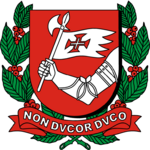Foreign relations of Belmonte
Belmonte is a key political and economic power of Asteria Inferior, having considerable influence over decision-making in the region. The Secretary of Foreign Affairs is responsible for leading Belmontese diplomatic efforts throughout the world, with its foreign policy reflecting Belmonte's position on the international stage as it is centred around core national interests such as national security, anti-terrorism and economic multilateralism.
Belmonte is considered to be a regional and middle power and is closely aligned with the ASTCOM and the Euclean Community on a variety of issues whilst having positive relations with the majority of nations in the world, especially on the areas of social, cultural and economic cooperation.
International organization memberships
| Organization | Ambassador to | Joined |
|---|---|---|
| Community of Nations | Michel Lemos | 1935 |
| Asteria Inferior Common Market | César Krampf | 1992 |
| International Council for Democracy | Teresa Rodrigues | 1938 |
| International Trade Organization | Filipe Gusmão | 1995 |
| Global Institute for Fiscal Affairs | Marcos Braga | 2001 |
Belmontese missions abroad
Asteria Inferior
Adamantina
Porto Pellegrini: Embassy (Ambassador Letícia Severó) Aucuria
Aucuria
Kalnaspilis: Embassy (Ambassador Carlos Braga) Gapolania
Gapolania
Nassea: Embassy (Ambassador João Bianchi)- File:ImaguaFlag.png Imagua and the Assimas
Cuanstad: Embassy (Ambassador Andressa Ferraro)  Nuvania
Nuvania
Pietersburg: Embassy (Ambassador Henrique Amaral) Satavia
Satavia
Port Hope: Embassy (Ambassador Renato d'Ávila) Satucin
Satucin
Gatôn: Embassy (Ambassador Teresa Batteux)
Pasau: Consulate-general (Consul-General Fábio Cavalcante)
Satau: Consulate-general (Consul-General Hugo Auclair)
Asteria Superior
 Ardesia
Ardesia
Rémont: Embassy (Ambassador Walter Rodrigues)
São Agostino: Consulate-general (Consul-General Hermes Sobral) Cassier
Cassier
New Rayenne: Embassy (Ambassador Felipe Alvim)
Andade: Consulate-general (Consul-General João-Luís Cardoso) Chistovodia
Chistovodia
Misto Myru: Embassy (Ambassador André Marques)- File:Eldmark.png Eldmark
Hammarvik: Embassy (Ambassador Ana Martins)  Rizealand
Rizealand
Camden: Embassy (Ambassador Ana Curschmann) Vinalia
Vinalia
Vinalinsk: Embassy (Ambassador Otávio Rizzi)
Coius
 Garambura
Garambura
Mutimukuru: Embassy (Ambassador Paulo Marinho)- File:RwizikuruFlag.PNG Rwizikuru
Guta raMambo: Embassy (Ambassador Eduardo Lemos)  Senria
Senria
Keisi: Embassy (Ambassador Rita Nakamura) Tsabara
Tsabara
Adunis: Embassy[1] (Ambassador Ângelo Gardet) Shangea
Shangea
Rongzhuo: Embassy (Ambassador Paulo Baumer)
Baiqiao: Consulate-general (Consul-General Vera Magalhães) Zorasan
Zorasan
Zahedan: Embassy (Ambassador Marcos Cilibrasi)
Euclea
 Alsland
Alsland
Yndyk: Embassy (Ambassador Adriano Dieker)Amathia
Arciluco: Embassy (Ambassador Lúcio Lettiere) Azmara
Azmara
Aalmsted: Embassy (Ambassador Ernane Rodrigues) Borland (Kylaris)
Borland (Kylaris)
Newstead: Embassy (Ambassador Talita Carvalho) Caldia
Caldia
Spálgleann: Embassy (Ambassador Bartolomeu Alvim)- Template:Country data Estmere
Morwall: Embassy (Ambassador André Passos)  Etruria
Etruria
Povelia: Embassy (Ambassador Armando Scamparini)
Tyrrhenus: Consulate-general (Consul-General Aurélio Pagnotto)
Solaria: Consulate-general (Consul-General Lúcia Arraes)Gaullica
Verlois: Embassy (Ambassador Emmanuel Bastet)
Rayenne: Consulate-general (Consul-General Aldo Camotto)
Lavelle: Consulate-general (Consul-General Beatrice Floquet) Geatland
Geatland
Blåstad: Embassy (Ambassador Juliano Góis) Hennehouwe
Hennehouwe
s'Holle: Embassy (Ambassador Gregório Lanza) Kesselbourg
Kesselbourg
Kesselbourg City: Embassy (Ambassador Guilherme Feldstein) Paretia
Paretia
Preceu: Embassy (Ambassador Fernando Freire)
Ocerto: Consulate-general (Consul-General Henrique Pena-Lopes)
Cresceu: Consulate-general (Consul-General Terêncio Gomes de Melo)
Vallenoche: Consulate-general (Consul-General Catarina Buarque)Solstiana
Kvitastrott: Embassy (Ambassador Carla Sobral) Soravia
Soravia
Samistopol: Embassy (Ambassador Fabrício Cruz) Werania
Werania
Westbrücken: Embassy (Ambassador Helmut Faehlmann)
Wiesstadt: Consulate-general (Consul-General Renata Carstens)
International organizations
 Community of Nations
Community of Nations
Kesselbourg City: Permanent mission Asteria Inferior Common Market
Asteria Inferior Common Market
Gatôn: Permanent mission International Council for Democracy
International Council for Democracy
Morwall: Permanent mission- International Trade Organization
Spálgleann: Permanent mission - Global Institute for Fiscal Affairs
Keisi: Permanent mission
Belmontese embassy in Pietersburg, Nuvania
Belmontese embassy in Westbrücken, Werania
Policy positions
Climate change
The first mention of climate change from the Belmontese government came in 1988, during the premiership of Félix Bragança, in which was declared that the country "should, in the next years, find ways to reduce its contribution towards climate change and environmental degradation." Since then, every government supported further international cooperation to stop climate change, with Belmonte itself being the place for several climate conferences to deal with the issue.
Refugees and asylum-seekers
Belmonte received almost five million immigrants throughout its history, from colonial times to the present day. Many of these immigrants came from Euclean countries, the majority of them being Luzelese, Esmeiran, Poveglian, Vespasian, Weranian, Caldish and, to some lesser extent, Gaullican, Hennish and Estmerish. There also were substantial immigrant groups from Senria and Shangea, as well as Bahian peoples who were either forcefully emigrated to become slaves or came voluntarily, such as the Gowsa people.
Given Belmonte's multicultural and miscegenated ethnic background, there is no immigration barriers or quotas whilst the law accepts any refugees and asylum-seekers that flees its country of origin due to persecution on account of its colour, religion or ethnicity, with said refugees being able to apply for Belmontese citizenship.
Tsabaran Civil War
After the outbreak of sectarian conflict in Tsabara, the Secretary of Foreign Affairs condemned the widespread violence and religious fundamentalism on both sides, supporting the federal government and the return of the democratic confessionalist system.
Chistovodia
Belmontese-Chistovodian relations always were cold due to its socialist regime. However, a normalization of relations between both countries has been underway since the 90s, especially under the areas of trade and scientific cooperation.
See also
- ↑ Given the outbreak of the Tsabaran Civil War, the Belmontese embassy in Adunis was temporarily closed. All relations are directly handled in Belmonte and Ângelo Gardet sill remains as ambassador.








